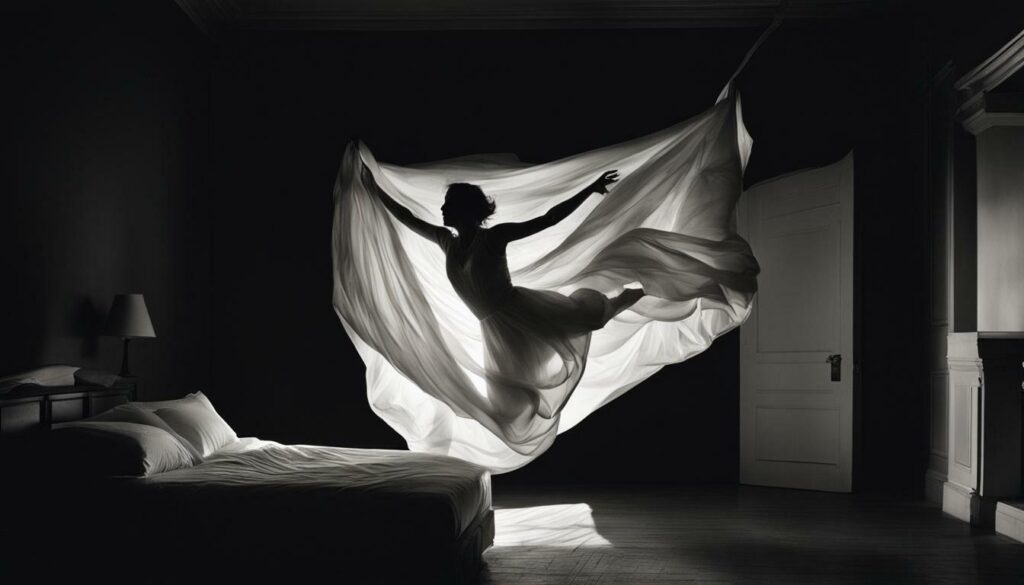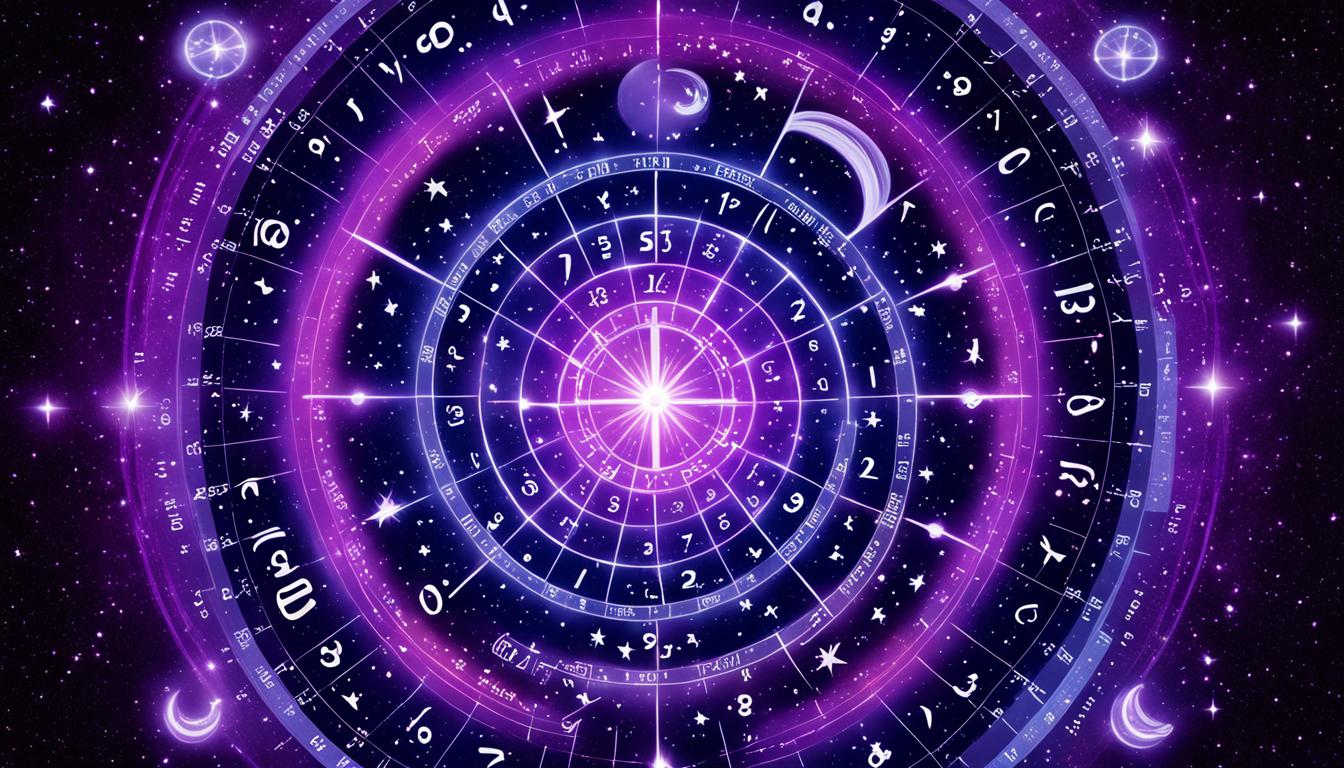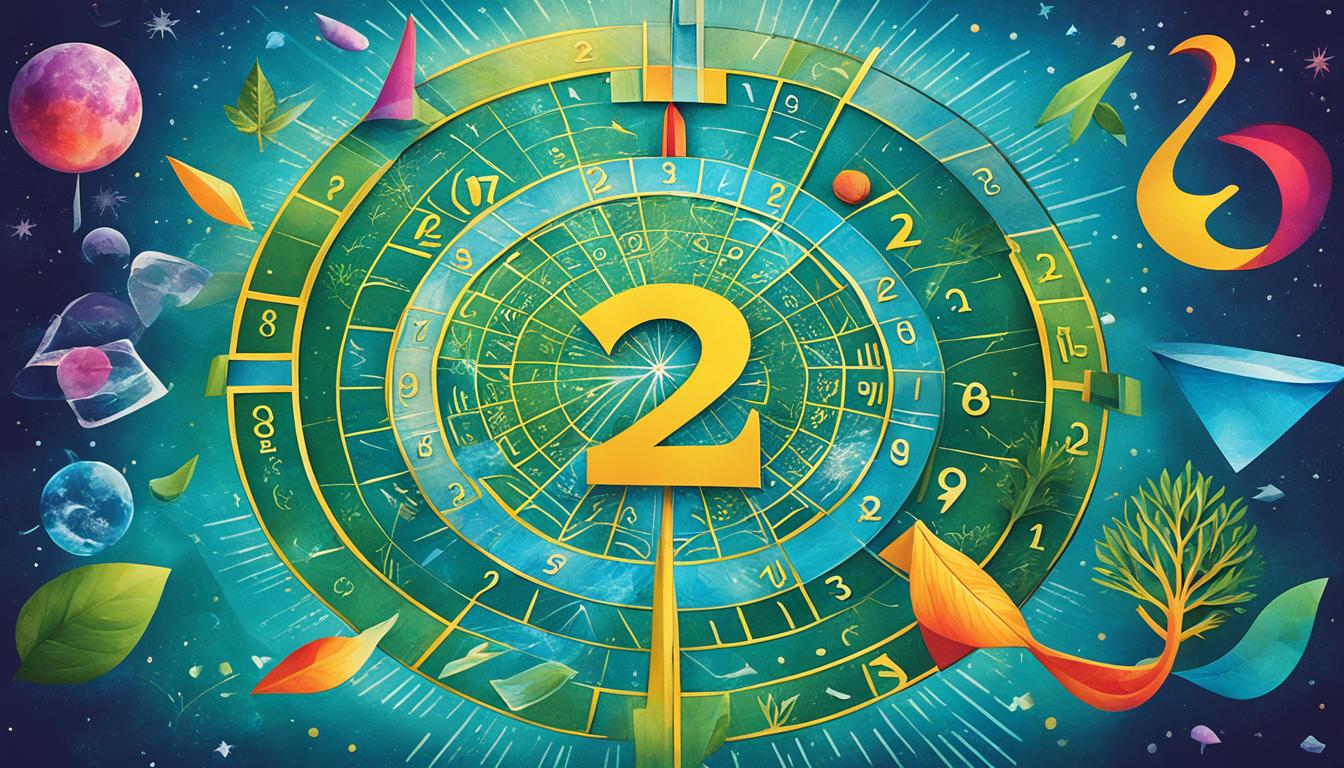Sleep is a mysterious state of consciousness that we experience daily, yet there are still many aspects of it that science does not fully understand, including the intriguing spiritual meaning of jumping in your sleep. Have you ever woken up abruptly from a dream, feeling as though you were physically leaping or jumping? This common sleep experience holds deeper significance beyond its surface-level explanation. By exploring the spiritual interpretations of jumping in sleep, we can gain insight into the connection between our subconscious mind and the spiritual realm.
Key Takeaways:
- Jumping in sleep is a common phenomenon that holds spiritual significance.
- Scientifically, jumping in sleep is associated with hypnic jerks and physiological causes.
- Spiritual interpretations of jumping in sleep include astral projection, out-of-body experiences, and subconscious symbolism.
- Self-reflection and inner work are important in understanding the spiritual meaning of jumping in sleep.
- Practical practices such as dream journaling, meditation, and mindfulness exercises can enhance our understanding of this experience.
- Spiritual interpretations are subjective and require an open mind for exploration.
Exploring the Scientific Explanations
In order to understand the potential spiritual significance of jumping in your sleep, it’s important to first explore the scientific explanations behind this phenomenon. Sleep experiences such as hypnic jerks, also known as sleep starts, are commonly associated with the sensation of jumping during sleep.
Hypnic jerks are brief muscle contractions or involuntary movements that occur as you transition from wakefulness to sleep. These jerks can manifest as a sudden twitch, jump, or falling sensation, often accompanied by a sense of anxiety or surprise. While the exact causes of hypnic jerks are not fully understood, several physiological factors have been identified.
One possible explanation is related to the neurotransmitter glycine, which plays a role in regulating muscle activity during sleep. Research suggests that a decrease in glycine levels in the spinal cord may lead to increased muscle excitability, triggering the occurrence of hypnic jerks. Additionally, the body’s transition from wakefulness to sleep involves changes in muscle tone and relaxation, which can contribute to the occurrence of these abrupt movements.
Stress, anxiety, and certain lifestyle factors can also contribute to the frequency and intensity of hypnic jerks. Excessive caffeine intake, for example, can disrupt the sleep cycle and increase muscle activity during sleep, potentially triggering more frequent jumping episodes. Similarly, medications that affect the central nervous system, such as stimulants or certain antidepressants, may also influence sleep patterns and contribute to the occurrence of hypnic jerks.
While hypnic jerks have a scientific basis, it’s important to note that their occurrence can vary from person to person. Factors such as individual sleep patterns, underlying health conditions, and overall sleep quality can influence the frequency and intensity of these movements. It’s always advisable to consult a healthcare professional if you have concerns about your sleep experiences or if they significantly impact your quality of sleep.

The Physiology of Hypnic Jerks
Hypnic jerks occur as we transition from wakefulness to sleep and are involuntary muscle twitches believed to be a result of our brain and body trying to relax and shut down for the night. These jerks can be characterized by sudden and brief movements, often accompanied by a feeling of falling or a jolt.
The physiology of hypnic jerks involves a complex interplay of neurotransmitters and muscle activity during sleep. One key neurotransmitter involved in the regulation of muscle movements is glycine. Glycine acts as an inhibitory neurotransmitter, which means it helps to reduce the excitability of motor neurons in the spinal cord.
During sleep, the levels of glycine in our brain increase, contributing to the relaxation and inhibition of muscle activity. However, in some cases, this process can be disrupted, leading to the occurrence of hypnic jerks. It is believed that a sudden release of accumulated muscle tension can trigger these involuntary twitches.
A study published in the Journal of Sleep Research suggests that the intensity and frequency of hypnic jerks may be influenced by various factors, such as caffeine intake, stress levels, and certain medications. Individuals who consume excessive amounts of caffeine or experience high levels of stress may be more prone to experiencing hypnic jerks. Additionally, some medications, such as certain antidepressants, may interfere with the normal sleep architecture, increasing the likelihood of experiencing these jerks.
The Role of Muscle Activity During Sleep
During sleep, our muscles undergo various stages of relaxation and activity. Rapid Eye Movement (REM) sleep, often associated with dreaming, is characterized by temporary paralysis of skeletal muscles, known as REM atonia. This paralysis is a protective mechanism that prevents us from acting out our dreams and potentially causing harm to ourselves.
However, during the transition from wakefulness to sleep, there can be fluctuations in muscle tone, leading to occasional jerks or twitches. These twitches are more prominent during the lighter stages of sleep, such as Stage 1 and Stage 2. As we enter deeper sleep stages, muscle activity decreases, and the occurrence of hypnic jerks tends to diminish.
Overall, the precise cause of hypnic jerks is not fully understood, and further research is needed to unravel the mechanisms behind these involuntary twitches. While they are generally harmless and do not require medical intervention, understanding the physiology of hypnic jerks can help individuals gain insight into their sleep experiences and alleviate any concerns or anxieties associated with these muscle twitches.
If you’d like to explore the spiritual meaning of jumping in your sleep further, continue reading to discover the spiritual interpretations of this phenomenon.

Potential Causes of Hypnic Jerks
While glycine release is one possible cause of hypnic jerks, other factors such as stress, anxiety, excessive caffeine intake, or certain medications can also play a role. These external triggers can disrupt the natural sleep cycle and contribute to the occurrence of hypnic jerks.
Stress and anxiety have been linked to various sleep disturbances, including hypnic jerks. When experiencing high levels of stress or anxiety, it can be challenging for the body to relax and enter a deep sleep state. This can lead to muscle tension and involuntary movements, such as jumping in sleep.
Excessive caffeine intake, especially close to bedtime, can also interfere with sleep patterns. Caffeine is a stimulant that can increase alertness and reduce the ability to fall into a deep sleep. Consequently, the body may react with sudden muscle contractions or jerks during sleep.
Furthermore, certain medications have been associated with an increased risk of hypnic jerks. Medications that affect the central nervous system, such as antidepressants or stimulants, can disrupt sleep patterns and contribute to muscle spasms during sleep.
To better understand the potential causes of hypnic jerks, it is essential to address and manage any underlying stress or anxiety levels. Engaging in stress-reducing activities, practicing relaxation techniques, and maintaining a balanced lifestyle can help promote better sleep quality and reduce the frequency of hypnic jerks.
Potential Causes of Hypnic Jerks
| Cause | Description |
|---|---|
| Stress | High levels of stress can lead to muscle tension and disrupt sleep patterns, contributing to hypnic jerks. |
| Anxiety | Anxiety can make it difficult for the body to relax, leading to involuntary muscle movements during sleep. |
| Excessive caffeine intake | Caffeine is a stimulant that can interfere with sleep, increasing the likelihood of hypnic jerks. |
| Medications | Certain medications that affect the central nervous system can disrupt sleep patterns and trigger hypnic jerks. |
While glycine release is one possible cause of hypnic jerks, other factors such as stress, anxiety, excessive caffeine intake, or certain medications can also play a role.
Managing stress levels, practicing good sleep hygiene, and discussing medication concerns with a healthcare professional can contribute to a better understanding and reduction of hypnic jerks.

Spiritual Interpretations of Jumping in Your Sleep
While hypnic jerks are generally considered to be harmless and not indicative of any underlying health issues, some individuals find meaning in these movements from a spiritual perspective. Across various indigenous cultures and belief systems, jumping in sleep is associated with spiritual experiences such as astral projection or out-of-body experiences. These beliefs offer alternative interpretations and open up intriguing possibilities for exploring the spiritual significance of sleep experiences.
Indigenous cultures around the world have long held beliefs that the soul can leave the body during sleep and travel to other realms or dimensions. This idea aligns with the concept of astral projection, which suggests that during sleep, the soul can separate from the physical body and explore different planes of existence. Some cultures view jumping in sleep as a sign that the soul is actively engaging in these astral travels.
“In our tribe, we believe that when you jump in your sleep, it means that your soul is exploring other worlds beyond this physical reality. It’s a journey of the spirit, where one can connect with ancestors and gain insights from higher realms.” – Indigenous Elder
Another spiritual interpretation of jumping in sleep is related to out-of-body experiences (OBEs). OBEs are similar to astral projection, but instead of traveling to different dimensions, the soul is believed to explore the earthly plane and observe the physical world from a detached perspective. In this context, jumping in sleep can be seen as a symbolic representation of the soul momentarily leaving the body and experiencing the freedom of movement that is unbounded by physical constraints.
It’s important to note that these interpretations are subjective and vary among different cultures and individuals. While some may embrace these spiritual beliefs, others may view jumping in sleep as mere physiological phenomena. The spiritual significance of sleep experiences is deeply personal and can be influenced by cultural background, personal beliefs, and individual experiences.

Jumping as Astral Projection or Out-of-Body Experience
In some spiritual traditions, jumping in your sleep is believed to be a form of astral projection or out-of-body experience, where the soul temporarily leaves the body and explores other realms or dimensions. This belief suggests that during these episodes of jumping, individuals are not bound by the physical constraints of their bodies and can venture into the vastness of the spiritual realm.
According to ancient wisdom, the soul is said to be an eternal entity that exists beyond the physical realm we experience in our everyday lives. It is believed to have the ability to transcend the confines of the body and travel to other spiritual planes and dimensions.
The concept of astral projection or out-of-body experiences can be found in various indigenous cultures and spiritual practices throughout history. These traditions view the soul as a separate entity that can detach itself from the physical body during sleep or deep meditation.
“The astral body, or the vehicle of the soul, is said to be able to travel to different dimensions and explore realms beyond our normal perception,” explains spiritual teacher and author, Lisa Smith. “When we jump in our sleep, it can be seen as a sign that our soul is taking flight, venturing into uncharted territories of the spiritual realm.”
This interpretation suggests that jumping in sleep is not merely a physical phenomenon but holds profound spiritual significance. It implies that our consciousness is more expansive than we often realize, capable of exploring the mysteries of existence beyond our earthly boundaries.

While there is limited scientific evidence to support the idea of astral projection or out-of-body experiences, many individuals have reported vivid and transformative encounters during these episodes. The subjective nature of these experiences makes it difficult to measure and quantify them in a scientific manner.
It is important to note that spiritual interpretations, including the belief in astral projection, can vary greatly among different cultures and individuals. Some may view jumping in sleep as a purely physiological phenomenon, while others see it as a gateway to higher levels of consciousness and spiritual exploration.
Subjectivity and Openness in Interpretations
Given the subjective nature of spiritual experiences, it is crucial to approach the interpretation of jumping in sleep with an open mind. While scientific explanations provide a rational understanding of the physiological causes behind these episodes, they may not encompass the full extent of the human experience.
Exploring the spiritual significance of jumping in sleep can be a deeply personal journey that offers insights into the nature of the self, the soul, and the interconnectedness of all things. It can serve as a catalyst for self-reflection, personal growth, and a deeper exploration of our spiritual potential.
- Embrace the mysteries of the spiritual realm
- Meditate to quiet the mind and enhance spiritual connection
- Keep a dream journal to document sleep experiences and their potential meanings
- Practice mindfulness to cultivate awareness and presence in the present moment
By engaging in these practices, individuals can deepen their understanding of jumping in sleep and embark on a transformative journey of self-discovery and spiritual exploration.
| Potential Benefits of Exploring the Spiritual Meaning of Jumping in Sleep: |
|---|
| Expanded consciousness and awareness |
| Greater understanding of the self and personal growth |
| Connection to higher realms and dimensions |
| Enhanced spiritual practices and exploration |
As individuals delve into the depths of their own spiritual journeys, they may uncover profound truths and insights that offer a deeper understanding of the mysteries of the universe and their own place within it.
Symbolism of Subconscious Desires and Unresolved Emotions
Another spiritual interpretation suggests that jumping in your sleep is a symbol of subconscious desires or unresolved emotions, with these movements arising from the subconscious mind trying to process and release pent-up energy or unexpressed feelings. This belief stems from the understanding that our dreams often serve as a doorway to our innermost thoughts and emotions, allowing us to explore and make sense of aspects of ourselves that may be hidden or repressed in our waking lives.
When we experience jumps or sudden movements in our sleep, it can be seen as a metaphorical representation of the inner turmoil or restlessness we may be experiencing on a subconscious level. These movements may signify a deep longing for change, a need to break free from emotional constraints, or a desire to confront and resolve unresolved issues that have been buried within us.
In the realm of dream interpretation and spiritual practices, it is believed that dreams are a reflection of the subconscious mind’s attempt to communicate and bring attention to aspects of our lives that may require healing or attention. Jumping in sleep can be seen as a symbolic indication that there are unresolved emotions or issues that need to be acknowledged and addressed.
According to Carl Jung, a renowned Swiss psychiatrist and psychoanalyst, dreams are a gateway to the unconscious mind and can offer valuable insights into our psyche. He believed that dreams often contain symbols and archetypes that represent deeper psychological meanings. In the context of jumping in sleep, Jung might interpret it as a manifestation of the unconscious trying to bring attention to suppressed emotions or repressed desires that are seeking expression.
“Dreams are the small hidden door in the deepest and most intimate sanctum of the soul, which opens to that primeval cosmic night that was the soul, long before there was the conscious ego.” – Carl Jung
Therefore, interpreting jumping in sleep as a symbolic representation of subconscious desires and unresolved emotions can provide us with an opportunity for self-reflection and personal growth. It calls us to delve deeper into our inner selves, confront our suppressed emotions, and take steps towards healing and resolution.
The Importance of Self-Reflection and Inner Work
Understanding the symbolic meaning behind jumping in sleep requires a willingness to engage in self-reflection and inner work. By exploring our dreams and paying attention to the emotions and themes that arise during these experiences, we can gain valuable insights into our subconscious mind and the underlying factors contributing to our sleep movements.
Self-reflection involves setting aside time to examine our thoughts, feelings, and behaviors, and to identify any patterns or recurring themes that may be influencing our dreams and sleep experiences. It is through this process that we can begin to uncover the deeper meanings and messages hidden within our subconscious.
In addition to self-reflection, practices such as meditation and mindfulness exercises can also support our exploration of the spiritual significance of jumping in sleep. These practices help to quiet the mind, cultivate self-awareness, and create a space for introspection and connection with our inner selves.
Practices for Deepening Your Understanding
To deepen your understanding of the spiritual meaning of jumping in your sleep, consider incorporating the following practices into your daily routine:
- Dream journal: Keep a journal beside your bed and write down your dreams as soon as you wake up. Pay attention to any recurring themes or emotions related to jumping in sleep.
- Meditation: Set aside time each day to practice meditation, allowing yourself to observe and explore the thoughts and emotions that arise during your sessions.
- Mindfulness exercises: Engage in activities that promote mindfulness, such as deep breathing exercises or mindful walking, to cultivate present-moment awareness and enhance your connection with your inner self.
By engaging in these practices, you can create a fertile ground for self-discovery and spiritual growth, enabling you to delve deeper into the meaning and significance of jumping in your sleep.

It is important to remember that interpretations of dreams and spiritual experiences are highly subjective and personal. What may hold significance for one person may have a different meaning for another. Therefore, approaching the interpretation of jumping in sleep with an open mind and a willingness to explore your own unique experiences is essential.
As you embark on your spiritual journey of understanding the meaning behind jumping in your sleep, embrace the opportunity for self-reflection, growth, and healing. By delving into your subconscious mind and addressing unresolved emotions, you can unlock profound insights and ignite personal transformation.
Reflection and Inner Work
Regardless of the specific spiritual interpretations, many practitioners believe that jumping in your sleep can serve as a reminder to prioritize self-reflection and inner work, providing an opportunity to delve into the depths of one’s psyche and explore any unresolved issues or suppressed emotions.
This introspective process involves turning inward and examining one’s thoughts, feelings, and experiences. By engaging in self-reflection, individuals can gain a deeper understanding of their inner selves and uncover hidden aspects of their psyche.
Self-reflection allows individuals to analyze their behaviors, beliefs, and values, enabling personal growth and transformation. It encourages individuals to question their assumptions, confront their fears, and challenge ingrained patterns of thinking.
Exploring the spiritual meaning of jumping in sleep through self-reflection can be a powerful tool in facilitating personal growth. It can help individuals address unresolved emotional issues, such as past traumas, suppressed desires, or unexpressed emotions.
By dedicating time and effort to inner work, individuals can cultivate self-awareness and develop a greater sense of clarity and purpose in their lives. They can gain insights into their deepest desires, discover their authentic selves, and align their actions with their true aspirations.
It is important to approach self-reflection with openness and honesty. This process requires individuals to be willing to confront uncomfortable truths and face their own vulnerabilities. However, the rewards of self-reflection are immense, as it can lead to personal transformation, increased self-acceptance, and enhanced overall well-being.
Practicing self-reflection can take various forms. Keeping a dream journal, for example, can be a valuable tool in exploring the spiritual significance of jumping in sleep. Recording dreams upon waking can provide insights into the subconscious mind, allowing individuals to uncover hidden symbolism or recurring themes.
Meditation and mindfulness exercises can also support the process of self-reflection. These practices enable individuals to cultivate a state of focused awareness and connect with their inner selves. Through meditation, individuals can observe their thoughts and emotions without judgment, gaining a deeper understanding of their inner experiences.
Engaging in artistic expression, such as writing, painting, or dancing, can also serve as a form of self-reflection. These creative outlets provide an opportunity to express and process emotions, explore subconscious desires, and gain new perspectives on personal experiences.
Ultimately, the practice of self-reflection and inner work is a deeply personal and individualized journey. It is important to find approaches that resonate with one’s own beliefs and values. By prioritizing self-reflection, individuals can unlock the spiritual meaning of jumping in sleep and embark on a path of personal growth and self-discovery.

Table: Benefits of Self-Reflection and Inner Work
| Benefits | Description |
|---|---|
| Increased self-awareness | Gain a deeper understanding of oneself, including beliefs, values, and motivations. |
| Personal growth | Challenge ingrained patterns of thinking, confront fears, and expand one’s perspective. |
| Emotional healing | Address unresolved emotional issues and promote healing from past traumas. |
| Improved decision-making | Make choices aligned with personal values and aspirations. |
| Enhanced self-acceptance | Cultivate greater self-compassion and acceptance of one’s flaws and imperfections. |
| Alignment with purpose | Discover authentic desires and align actions with personal aspirations. |
“Self-reflection is the school of wisdom.”
– Baltasar Gracian
By engaging in self-reflection and inner work, individuals can embark on a spiritual journey of self-discovery and personal growth. Through this process, the meaning of jumping in sleep can be explored, offering valuable insights into one’s subconscious mind and emotional landscape. So, embrace the opportunity for self-reflection and unlock the transformative power within.
Practices for Deepening Your Understanding
If you frequently experience jumping or jerking movements during sleep and are curious about their spiritual significance, there are several practices that you can incorporate into your routine to deepen your understanding.
Dream Journal
Keeping a dream journal can be a valuable tool for exploring the spiritual meaning of jumping in your sleep. Upon waking, take a few moments to jot down any dreams or sleep experiences that involved jumping or jerking movements. Pay attention to any emotions, symbols, or recurring themes in your dreams. Over time, patterns may emerge that could offer insights into the spiritual significance of these experiences.
Meditation
Meditation can help calm the mind and create a space for deeper introspection. Set aside dedicated time each day to practice meditation. Focus on your breath and allow any thoughts or sensations related to jumping in your sleep to arise without judgment. By observing these experiences with a curious and open mind, you may gain new perspectives and a deeper understanding of their spiritual meaning.
Mindfulness Exercises
Mindfulness exercises can enhance your awareness of the present moment and help you cultivate a deeper connection with your body and mind. Incorporate mindfulness into your daily routine by engaging in activities such as mindful walking, body scans, or mindful eating. During these practices, observe any sensations or thoughts related to jumping in your sleep. By staying present and accepting of these experiences, you may uncover valuable insights.
If you want to understand the spiritual significance of jumping in your sleep, it is crucial to approach these practices with an open mind and without expectations. Remember that interpretations may vary and that your personal experiences and beliefs will shape your understanding. Allow yourself to embrace the journey of self-discovery and personal growth.

By incorporating practices such as dream journaling, meditation, and mindfulness exercises into your routine, you can deepen your understanding of the spiritual meaning behind jumping in your sleep. These practices offer opportunities for self-reflection, inner exploration, and personal growth. Remember to approach these experiences with an open mind and embrace the journey of uncovering the hidden messages within your sleep experiences.
Subjectivity and Openness in Interpretations
It’s important to note that the spiritual interpretations of jumping in your sleep, like many aspects of spirituality, are subjective and can vary greatly from person to person, requiring an open mind and a willingness to explore different perspectives. Each individual’s experience, beliefs, and cultural background can shape their understanding of this phenomenon. Therefore, it is essential to approach these interpretations with curiosity, empathy, and a recognition of the diversity of human experiences.
When delving into the spiritual realm, it is crucial to remember that there is no one-size-fits-all explanation for jumping in your sleep. The interpretation of this experience can depend on one’s personal beliefs, cultural context, and spiritual practices. It is a deeply personal journey that requires self-reflection and respectful engagement with different spiritual traditions.
“Spiritual interpretations are deeply subjective. They arise from the depths of our subconscious mind and reflect our unique perspectives, desires, and fears. Just as dreams can hold multiple layers of meaning, jumping in sleep can be seen as a metaphorical representation of our inner conflicts, unresolved emotions, or unconscious desires.”
– Spiritual Teacher
Some individuals may perceive jumping in sleep as a symbolic manifestation of their subconscious desires or unresolved emotions. The act of jumping can be seen as an expression of the soul’s attempt to break free from the constraints of everyday life, seeking liberation and expansion. It may signal a yearning for adventure, change, or a desire to explore new dimensions of existence.
Others may interpret jumping in sleep as a form of astral projection or an out-of-body experience. According to certain spiritual traditions, the soul can leave the physical body during sleep and journey into other realms or dimensions. Jumping could be viewed as a moment when the soul detaches from the body, exploring the vastness of the spiritual realm.
Subjectivity plays a significant role in these interpretations, as each individual’s spiritual journey and understanding are unique. Cultural influences also shape the way jumping in sleep is perceived. Indigenous cultures, for example, may have their own spiritual beliefs and practices surrounding sleep experiences.
“In my tribe, jumping in sleep is considered a sign of a strong connection with the spirit world. It is believed that during these moments, the soul is in communication with ancestors, receiving messages and guidance from the spiritual realm.”
– Indigenous Elder
Engaging in self-reflection and inner work can deepen our understanding of the spiritual significance of jumping in sleep. By exploring our subconscious mind and addressing unresolved issues, we may uncover hidden meanings behind our experiences. Meditation, dream journaling, and mindfulness exercises can be valuable tools in this journey of self-discovery.
While exploring the spiritual interpretations of jumping in sleep, it is essential to maintain an open mind. Spiritual experiences are deeply personal and can hold different meanings for different individuals. Approaching these interpretations with curiosity and respect for diverse perspectives can enrich our understanding and promote personal growth.
Remember, the exploration of spiritual interpretations is a unique and individual journey. Embrace the subjectivity and allow yourself to be open to new revelations and insights.

Conclusion
In conclusion, while the scientific explanation for jumping in your sleep may be rooted in physiological processes, some individuals find spiritual meaning in these movements, viewing them as catalysts for exploring one’s spiritual path and promoting personal growth. The physiological reasons behind jumping in sleep, such as hypnic jerks and muscle activity, provide a scientific understanding of these experiences. However, there is also a rich spiritual interpretation associated with jumping in sleep.
For some indigenous cultures, jumping in sleep is seen as a form of astral projection or an out-of-body experience, where the soul travels to other realms or dimensions. This belief opens up possibilities for exploring the spiritual dimensions of jumping in sleep and delving into the mysteries of the subconscious mind.
Furthermore, jumping in sleep can be interpreted as a symbol of subconscious desires or unresolved emotions. It may serve as a reflection of suppressed emotions or unresolved issues, guiding individuals towards deeper self-reflection and inner work. By paying attention to these experiences, one can embark on a personal journey of self-discovery and growth.
Engaging in practices such as keeping a dream journal, practicing meditation, and incorporating mindfulness exercises can foster a deeper understanding of the spiritual significance of jumping in sleep. These practices allow individuals to tap into their inner selves and explore the hidden meanings behind their experiences. They provide an avenue for introspection and personal growth.
It’s important to approach these spiritual interpretations with subjectivity and openness, as the meaning of jumping in sleep can vary from person to person. Each individual’s experiences and beliefs shape their understanding of these phenomena, and it’s crucial to respect and honor diverse interpretations.
By embracing the spiritual journey presented by jumping in sleep, individuals have the opportunity to embark on a path of personal growth. Through self-reflection, exploration of the subconscious, and engagement in spiritual practices, one can unlock the transformative power of these experiences and gain valuable insights into the depths of their being.
Unlock the Spiritual Meaning of Jumping in Your Sleep
Introduction:
– Discuss the topic of jumping in sleep and its spiritual significance
Exploring the Scientific Explanations:
– Understand the physiological reasons behind jumping in sleep
– Association with hypnic jerks
The Physiology of Hypnic Jerks:
– Explanation of the physiological processes that lead to hypnic jerks during sleep
– Role of neurotransmitter glycine and muscle activity during sleep
Potential Causes of Hypnic Jerks:
– Identify potential factors that may contribute to the occurrence of hypnic jerks
– Stress, anxiety, excessive caffeine intake, medications
Spiritual Interpretations of Jumping in Your Sleep:
– Explore the spiritual beliefs and interpretations associated with jumping in sleep
– Indigenous cultures, astral projection, out-of-body experience
Jumping as Astral Projection or Out-of-Body Experience:
– Discuss the belief that jumping in sleep may be a form of astral projection or out-of-body experience
– Connection to the soul, other realms, and dimensions
Symbolism of Subconscious Desires and Unresolved Emotions:
– Explore the interpretation of jumping in sleep as a symbol of subconscious desires or unresolved emotions
– Influence of the subconscious mind, unresolved issues, and suppressed emotions
Reflection and Inner Work:
– Highlight the importance of self-reflection and inner work in exploring the meaning of jumping in sleep
– Connect with the inner self and promote personal growth
Practices for Deepening Your Understanding:
– Provide practical suggestions for individuals interested in exploring the spiritual significance of jumping in sleep
– Keep a dream journal, practice meditation, and engage in mindfulness exercises
Subjectivity and Openness in Interpretations:
– Emphasize the subjective nature of spiritual interpretations
– Encourage an open-minded approach to these experiences
Conclusion:
– Summarize the main points discussed
– Emphasize the potential for personal growth and spiritual exploration through the experience of jumping in sleep



